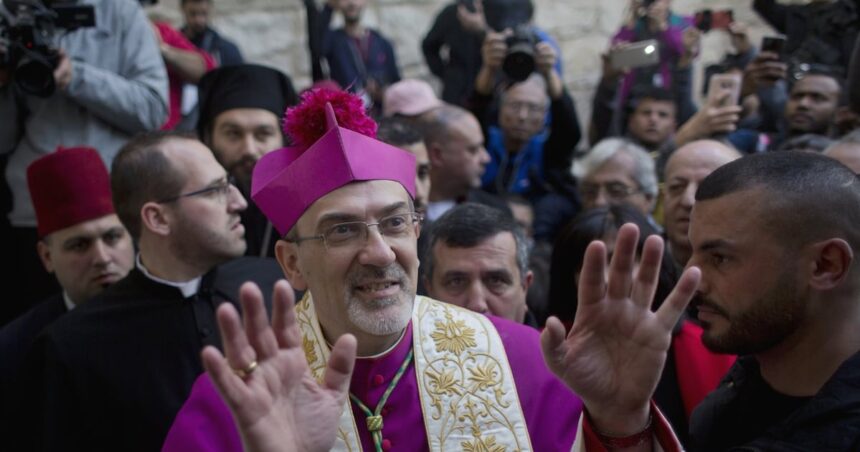The sun burned bright over the twisted metal and scorched stone as Cardinal Pierbattista Pizzaballa, the Latin Patriarch of Jerusalem, stepped through the rubble where the Greek Orthodox Church of Saint Porphyrius once stood. This rare joint solidarity mission with Greek Orthodox Patriarch Theophilos III marks the first time high-ranking Christian leaders have entered Gaza since Israel’s devastating October 7 offensive began.
“What we witnessed today cannot be described with words,” Pizzaballa told me, his voice breaking slightly as we walked through what remained of the church compound. “These are not just buildings. This is the living history of Christianity in this land, dating back centuries. And now it lies in ruins.”
The patriarchs’ visit comes three weeks after Israeli airstrikes hit the church complex on October 19, killing at least 18 Palestinians who had sought refuge in the historic sanctuary. According to the Gaza Health Ministry, the majority of those killed were women and children from Christian families who believed the church would offer protection from the bombing that has now claimed over 11,000 Palestinian lives.
Israel’s military initially claimed the strike targeted a Hamas command center operating within the church grounds, an assertion immediately rejected by church officials and survivors. After international backlash, Israeli authorities later acknowledged the strike was “a tragic mistake” resulting from faulty intelligence, though this explanation has done little to quell global outrage.
“The faithful here are asking fundamental questions,” Orthodox Patriarch Theophilos told a small gathering of local Christians who remain in Gaza. “Where can we be safe? If a house of God offers no protection, what will?”
According to the United Nations Office for the Coordination of Humanitarian Affairs (OCHA), Gaza’s pre-war Christian community numbered approximately 1,000 people. Church leaders now estimate fewer than 600 remain, with many killed or having fled to southern areas. The Church of Saint Porphyrius, dating back to the 12th century, served as both spiritual center and humanitarian refuge during successive conflicts.
Father Gabriel Romanelli, who accompanied the patriarchs, showed me charred prayer books scattered amid the debris. “Before October, we distributed food to 500 Muslim families weekly. Our doors were open to all. Now we cannot even guarantee safety to those who seek shelter with us,” he explained.
During their brief six-hour visit, the church leaders toured multiple damaged religious sites and met with local clergy who have remained to serve the dwindling community. They brought limited medical supplies and sacramental items but acknowledged the gesture was largely symbolic against the magnitude of suffering.
“We came to say: you are not forgotten,” Pizzaballa said. “The world may look away, but the church stands with Gaza’s suffering people – Christian and Muslim alike.”
What makes this solidarity visit particularly significant is its ecumenical nature. Relations between Catholic and Orthodox hierarchies have often been strained, yet this crisis has fostered unprecedented cooperation. The World Council of Churches, representing 580 million Christians globally, has called the Gaza church bombing “a potential war crime” requiring independent investigation.
The humanitarian situation throughout Gaza continues to deteriorate rapidly. The World Food Programme reports nearly the entire population faces acute food insecurity, while only 11 of Gaza’s 36 hospitals remain partially functional according to the World Health Organization.
Wassim Abeed, a Palestinian Christian whose cousin died in the church bombing, told me his family has been displaced four times since October. “We thought churches would be respected,” he said, his voice barely audible. “Now we understand nowhere is safe.”
The patriarchs’ convoy traveled through heavily damaged neighborhoods where residents described increasingly desperate conditions. Many recognized the visiting clerics and approached to share stories of lost family members or destroyed homes.
Both patriarchs have called for an immediate ceasefire and unhindered humanitarian access. In a joint statement released before departing Gaza, they condemned “indiscriminate violence against civilians regardless of faith or nationality” and urged international powers to prioritize civilian protection.
Israeli authorities granted limited access for the delegation after extensive diplomatic negotiations involving the Vatican and multiple international mediators. While Israeli officials declined direct comment on the visit, a military spokesperson reiterated the strike was “an operational error” and that “Christian sites are not targets.”
For Gaza’s Christians, who have maintained continuous presence since the early centuries of Christianity, this latest conflict represents an existential threat. Church leaders fear the tiny community may disappear entirely under the current conditions.
As darkness fell and the patriarchs prepared to leave, elderly Gaza Christian Maryam Tarazi pressed a tattered family Bible into Pizzaballa’s hands. “If we die here,” she whispered, “keep this safe so someone remembers we existed.”
The church leaders departed as they had arrived – under heavy security and with the thunder of distant explosions punctuating their prayers. They promised to amplify Gaza’s suffering to a world that seems increasingly numb to its pain. Whether their voices will make any difference remains the unanswered question hanging over the rubble of Saint Porphyrius.






